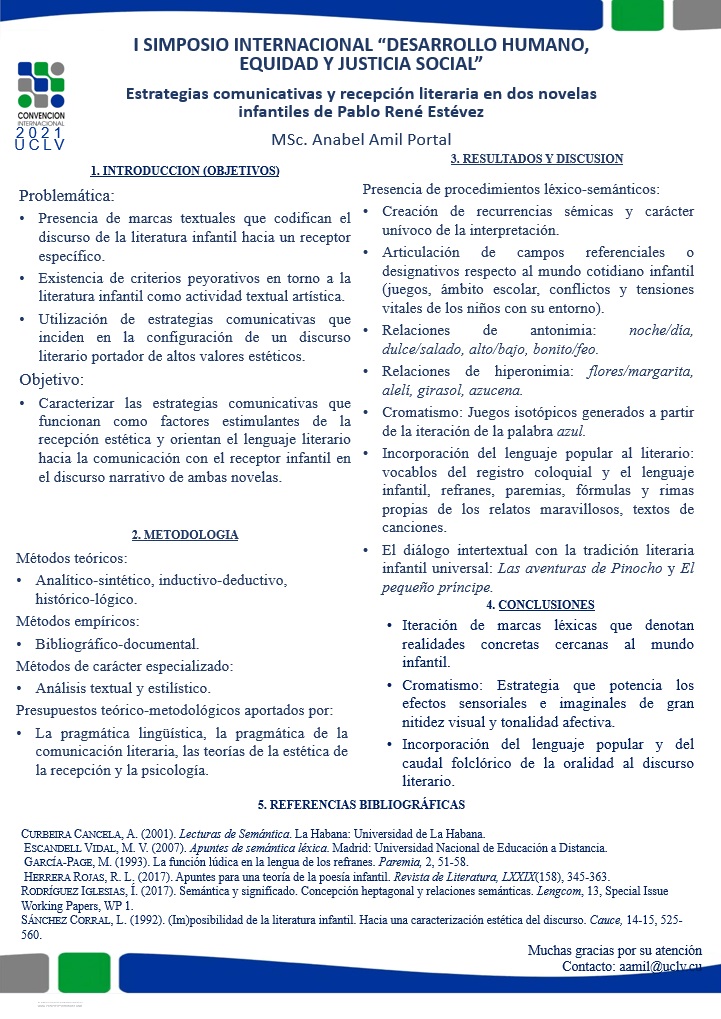Executive Secretary

Simposio Internacional “Desarrollo Humano, Equidad y Justicia Social"

Una de las cuestiones subyacentes en la discusión sobre el estatus artístico de la literatura infantil es su carácter de textualidad polarizada pragmáticamente hacia un receptor específico, lo que ha justificado la existencia de criterios peyorativos que señalan que tal rasgo le resta literariedad a los textos clasificados como «infantiles». En contraposición con estos criterios, se ha demostrado que esta tensión entre literariedad y comunicación es resuelta en la obra de numerosos creadores a través de estrategias que, adecuándose a las características cognitivas y afectivas del receptor infantil, influyen asimismo en la configuración de un discurso portador de altos valores estéticos. En correspondencia con ello, nos trazamos como objetivo: Caracterizar las estrategias comunicativas linguoestilísticas que orientan el discurso literario hacia la comunicación estética con el receptor infantil en dos novelas de Pablo René Estévez. Se aplicaron métodos de carácter teórico que, junto al bibliográfico-documental, permitieron fundamentar el marco teórico-metodológico de la investigación. Estos métodos, junto con el análisis textual y estilístico, permitieron clasificar aquellas estrategias linguoestilísticas que inciden en la comunicación con el receptor infantil. Entre los principales resultados destaca la identificación de un repertorio de recursos que funcionan como estimulantes de la aprehensión estética de los textos, apelando a la sensibilidad y a las peculiaridades afectivas y cognitivas del receptor infantil. El análisis permitió constatar la existencia, en ambas novelas, de estrategias que funcionan como marcas conductoras de la recepción mediante la articulación de isotopías y la iteración de diversas unidades lingüísticas.
One of the underlying questions in the discussion on the artistic status of children’s literature is its character of textuality pragmatically polarized towards a specific receptor, which has justified the existence of pejorative criteria that indicate that the aforementioned characteristic detracts from the literariness of texts classified as “children’s”. In contrast to these criteria, it has been shown that this tension between literariness and communication is resolved in the work of numerous creators through strategies that, by adapting to the cognitive and affective characteristics of the child receptor, also influence the configuration of a discourse with high aesthetic values. In correspondence with this, our objective is to characterize the linguostylistic communicative strategies that guide the literary discourse towards the aesthetic communication with the child receptor in two novels by Pablo René Estévez. Theoretical methods were applied which, together with bibliographic-documentary method, allowed the theoretical-methodological framework of the research to be based. These methods, together with the textual and stylistic analysis, allowed us to classify the linguostylistic strategies that influence the communication with the child receptor. Among the main results, we can mention the identification of a repertoire of resources that function as stimulants of the aesthetic apprehension of the texts, appealing to the sensitivity and the affective and cognitive particularities of the child receptor. The analysis allowed us to ascertain the existence, in both novels, of strategies that function as conductive marks of reception through the articulation of isotopies and the iteration of various linguistics units.
Sobre el ponente

MsC. Anabel Amil Portal
